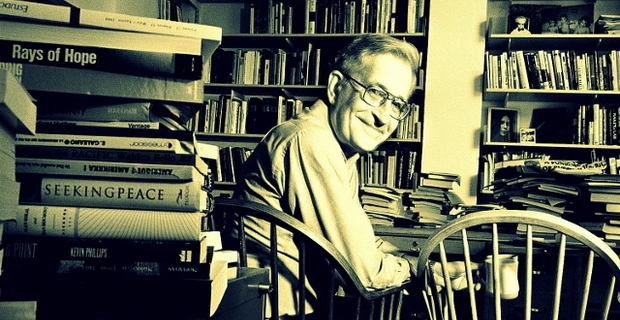
L’un des exemples choisis par le film fut le traitement par le New York Times du terrible génocide commis par l’armée indonésienne, avec l’aide des Américains, à l’encontre du Timor oriental : des centaines de milliers de victimes furent dérobées à la bonne conscience par les médias, vu le rôle joué par l’armée américaine en Indonésie, sous prétexte de contribuer à la lutte au communisme.
Réalisé par Mark Achbar et le regretté Peter Wintonick (1953-2013), ce documentaire d’une durée de 167 minutes connut un succès qui dépassa toutes leurs espérances et qui ne sera réédité qu’une douzaine d’années plus tard par le film de Mark Achbar Corporation.
Documentaire sur le philosophe et linguiste politique Noam Chomsky, à partir principalement de son ouvrage Manufacturing Consent, il s’agit d’un essai d’autodéfense réussi contre la propagande médiatique et la désinformation qui formate les citoyens ainsi que l’homogénéisation de leur conscience par la pensée dominante. On se souviendra que Dimitri Roussopoulos, de Black Rose Books et vice-président des APLP dans les années 80, fut le tout premier éditeur nord-américain à avoir le courage de publier les premiers écrits politiques de Chomsky, célèbre pacifiste anarcho-syndicaliste et éminent professeur au Massachussets Institute of Technology.
La projection du film aura lieu le dimanche 26 novembre à 15H au Centre internationaliste (CERFA) : c’est une activité gratuite au 160 St-Viateur Est, suite 707, dans le Mile-End.
Ceux et celles qui ne voudront pas rater le vernissage de l’exposition Migrants de David Moore à 14 heures le même jour au 150, rue du Centre-Civique au Mont-Saint-Hilaire peuvent voir le film sur le site de l’Office National du Film ou sur youtube en cliquant ici.
Site FAIR (Fairness & Accuracy In Reporting) writes in November 2017:
In the obituary of Edward Herman, New York Times‘ Sam Roberts wrote of the classic book that Ed co-wrote with Noam Chomsky: “Manufacturing Consent was severely criticized as having soft-pedaled evidence of genocide in Cambodia, Rwanda and, during the Bosnia war, Srebrenica.”
The problem with this statement is that Manufacturing Consent was published in 1988 — years before the 1994 Rwandan genocide or the 1995 Srebrenica massacre. And the book does deal at length with the Cambodian mass murders. It cites as the best analysis of Cambodian losses before, during and after Khmer Rouge rule, the work of historian Michael Vickery, who estimated that the Khmer Rouge executed some 200,000 to 300,000 people, with a total of about 750,000 excess deaths (out of a population of about 7 million) due to killings, famine and disease, during their three-year reign. Vickery found that a lesser but comparable figure, about half a million, were killed in the US bombing of Cambodia beginning in 1969 and the concurrent Cambodian civil war.
The book did not argue that the Khmer Rouge’s Pol Pot was not guilty of mass murder, but rather that different standards of evidence and vastly different levels of outrage were applied to atrocities committed by the United States compared to those of official enemies — the latter having “worthy victims” and the former “unworthy,” in the book’s terminology.
Herman and Chomsky note that they came under sustained attack — referred to as “apologists for Khmer Rouge crimes” and the like— for insisting that the same standards be applied to mass violence, regardless of the perpetrators. As the authors say:
“Charges against dissident opinion require no evidence and …ideologically useful accusations will stand merely on the basis of endless repetition, no matter how ludicrous they may be.”
The New York Times’ posthumous accusation that Manufacturing Consent was criticized for downplaying atrocities that happened years after it was published certainly falls in the “ludicrous” category.